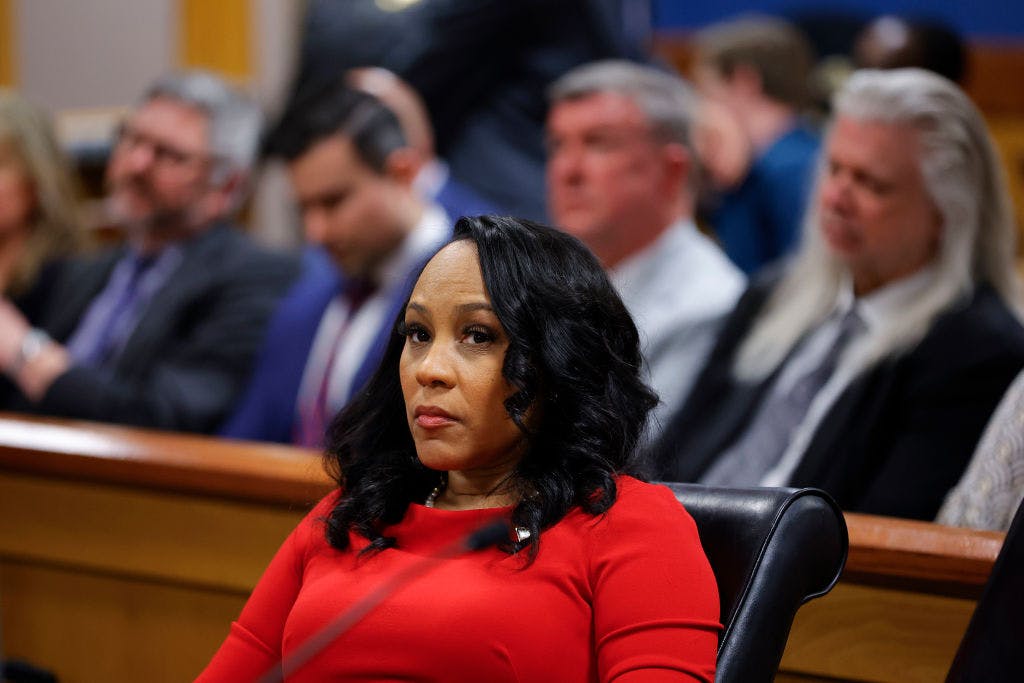Fani Willis Is Called a ‘Global Laughingstock’ as She Denounces Trump’s Case Against Her, Over Secret Romance, as ‘Absurd’
A ruling could come soon as to whether the district attorney is disqualified from prosecuting Trump because of her ‘personal relationship’ with a former boyfriend.

A high-stakes hearing in open court on Friday sets the stage for a ruling that could either bolster the district attorney of Fulton County, Fani Willis, or disqualify her from prosecuting one of the most anticipated cases in American history.
The case for disqualification, which centers on the “personal relationship” between Ms. Willis and her former boyfriend and special prosecutor, Nathan Wade, has more often resembled a soap opera than a dry legal proceeding. It will be up to Judge Scott McAfee to discern whether a conflict of interest, or even the mere appearance of one, is enough to derail the case.
An attorney, Richard Rice, for one of Ms. Willis’s co-defendants, Robert Cheeley, accused the prosecutorial pair of living “Robin Leach’s ‘Lifestyle of the Rich and Famous,’ and they did this riding on the backs of the defendants in this case, funded by the taxpayers of Fulton County in the state of Georgia.” Mr. Rice castigated what he called the “money flow” between the two.
The defendants — including President Trump — point to the more than $650,000 that Ms. Willis’s office has paid to Mr. Wade for his services, and the more than $17,000 that he spent on trips for the two of them. Ms. Willis has defended her former lover as the possessor of “impeccable” credentials and insists that she has reimbursed him in cash for their vacations, which have included expeditions to Napa Valley, Aruba, and Belize.
An attorney, Adam Abbate, for Ms. Willis, who was in court on Friday, castigated the defendants for seeking to “embarrass and harass” her client and working to “impugn her character.” He added that “there’s absolutely no evidence that the defendants in this case, their due process rights, have been harmed in absolutely any way.” He characterized the case against Ms. Willis as “absurd. It’s absolutely absurd.”
Ms. Willis’s fate in the case could hang on the burden that Judge McAfee rules that her foes must carry. If he decides that even an “appearance” of a conflict of interest is fatal, then it is more likely that the disqualification motions succeed. If, though, the defendants are obligated to show an “actual” conflict of interest, Ms. Willis and Mr. Wade could live to prosecute another day.
An attorney, Howard MacDougald, for another defendant, Jeffrey Clark, declared that Ms. Willis “cannot distinguish between her personal interests and her public duties as a prosecutor.” He reckons that the district attorney’s behavior has put an “irreparable stain” on the case and that her office has become a “global laughingstock because of their conduct.”
Both Ms. Willis and Mr. Wade have, under oath, declared that their romance began only after he was hired, and thus could not have been a motivating factor for why he was given the prestigious post. Mr. Trump’s attorneys, though, have adduced telephone records from AT&T that show nearly 12,000 text messages and 2,000 calls between the two prior to when they claim to have started dating.
Mr. Rice, the defense attorney, reckoned, “I don’t even think lovestruck teenagers communicate that much.” With respect to one of the more than 35 late-night visits that the phone records suggest Mr. Wade could have made to Ms. Willis’s home, the lawyer explained that “teenagers have a name for those kinds of calls and those kinds of escapades. I won’t go into it.”
A separate correspondence, between a former colleague of Mr. Wade’s, Terrence Bradley, and the lawyer who first brought the disqualification motion, Ashleigh Merchant, has thrown into sharp relief the possibility that Ms. Willis and Mr. Wade could have perjured themselves. Mr. Bradley, who was also Mr. Wade’s divorce lawyer, wrote that he was “absolutely” convinced that the two started dating prior to when Mr. Wade joined the prosecution team.
Mr. Bradley now gainsays the authoritativeness of those messages, judging them to be grounded in mere “speculation.” A lawyer for Mr. Wade, Andrew Evans, argues that they “contain several outright lies.” The New York Times reports that one of those alleged “lies” is that Mr. Evans and his wife, a Democrat and state representative, “witnessed Mr. Wade and Ms. Willis having sex.”
Judge McAfee, attempting to keep the focus on black letter law, asked Ms. Willis’s counsel, Mr. Abbate, whether he knows of “an appellate opinion that relies only on an appearance of impropriety as it relates to a prosecutor or a district attorney?” The lawyer answered, “Yes, that’s what I am saying.”
Ms. Merchant’s husband, who represents another defendant, Michael Roman, declared that “we can demonstrate an appearance of a conflict of interest and that is sufficient.” Mr. Trump’s lawyer, Steven Sadow, argued that “once you have the appearance of impropriety, the law in Georgia is clear: That’s enough to disqualify.”

